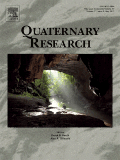
QUATERNARY RESEARCH
metrics 2024
Illuminating Interdisciplinary Insights into Earth's Recent Changes.
Introduction
QUATERNARY RESEARCH, published by Cambridge University Press, is a leading academic journal that focuses on the study of the Quaternary Period, the most recent geological time period. With a strong emphasis on interdisciplinary research, the journal has significantly contributed to our understanding of Earth's dynamic systems and processes, making it an essential resource for researchers and professionals in the fields of Earth and Planetary Sciences, Earth-Surface Processes, and the Arts and Humanities. It is recognized for its high-impact contributions, reflected in its impressive Q1 rankings across multiple categories, including its position as 69th out of 552 in Arts and Humanities and 49th out of 195 in General Earth and Planetary Sciences, showcasing its influence and relevance in the academic community. While QUATERNARY RESEARCH does not provide open access options, it remains a crucial platform for disseminating valuable research findings and fostering scholarly dialogue. The journal's coverage spans from 1970 to 2024, serving as a comprehensive archive of key developments in the field.
Metrics 2024
 0.79
0.79 1.70
1.70 2.00
2.00 127
127Metrics History
Rank 2024
Scopus
IF (Web Of Science)
JCI (Web Of Science)
Quartile History
Similar Journals

QUATERNAIRE
Fostering Collaboration in Earth Sciences and Environmental Research.QUATERNAIRE is a reputable journal managed by the Société Géologique de France, specializing in the realms of Earth-Surface Processes and Geology. This esteemed publication has been a vital platform for scientific discourse since its inception, presenting compelling research and insights from both fields. With a significant impact in the academic community, it currently holds a Q3 quartile ranking in the 2023 Scopus categories, demonstrating its importance in disseminating knowledge related to geological phenomena. Although QUATERNAIRE does not have an open access model, it ensures that critical research is accessible to a wide audience, enhancing collaboration among geoscientists and environmental researchers. Based in France at 77, Rue Claude-Bernard, Paris F-75005, this journal continues to evolve its publication scope, welcoming contributions that delve into the intricacies of Earth's processes from 1990 to 2024. Researchers, professionals, and students alike will find valuable resources and inspiration within its pages, contributing to a deeper understanding of our planet's past and present.

E&G Quaternary Science Journal
Fostering Global Insights in Quaternary ResearchE&G Quaternary Science Journal, published by COPERNICUS GESELLSCHAFT MBH in Germany, stands as a prominent open-access platform dedicated to disseminating high-quality research in the fields of archaeology, geology, paleontology, and stratigraphy since its inception in 1979. With its ISSN 0424-7116 and E-ISSN 2199-9090, the journal has achieved remarkable recognition, indicated by its Q1 quartile ranking in archaeology across both arts and humanities sections, and its strong placements within the social sciences and Earth sciences categories. The journal provides crucial insights into the Quaternary period, contributing to our understanding of climate change, human evolution, and geological processes, making it invaluable for researchers, professionals, and students engaged in these collaborating disciplines. As an open-access journal since 2008, it ensures that cutting-edge research is readily available to a global audience, promoting knowledge exchange and facilitating advancements within the scientific community. The continuous commitment to excellence and its strategic focus on high-impact research positions E&G Quaternary Science Journal as a cornerstone publication in quaternary science.

BULLETIN OF GEOSCIENCES
Pioneering Insights in Earth and Planetary SciencesBULLETIN OF GEOSCIENCES, published by the prestigious Czech Geological Survey, stands as a pivotal resource in the fields of Earth and Planetary Sciences and Environmental Science. Since its inception in 2003, the journal has been committed to advancing knowledge through high-quality research, currently holding a commendable Q2 ranking in both disciplines. With its focus on diverse and innovative topics, BULLETIN OF GEOSCIENCES provides an essential platform for researchers, professionals, and students aiming to disseminate and access impactful studies. The journal is indexed in Scopus, ranking #78/195 in General Earth and Planetary Sciences and #110/233 in General Environmental Science, reflecting its significant contribution to academia. Publishing from Prague, Czech Republic, this journal invites contributions that illuminate the interactions between geological processes and environmental phenomena, ensuring an inclusive and accessible approach to crucial global issues.

INTERNATIONAL JOURNAL OF EARTH SCIENCES
Connecting Global Insights in Earth SciencesINTERNATIONAL JOURNAL OF EARTH SCIENCES, published by Springer, is a leading journal in the field of Earth and Planetary Sciences, distinguished by its Q1 quartile ranking in the 2023 category of Earth and Planetary Sciences (miscellaneous). With an ISSN of 1437-3254 and an E-ISSN of 1437-3262, this journal has been a pivotal platform for researchers, academics, and practitioners since its inception in 1996. The journal's focus encompasses a broad range of topics within Earth sciences, making it a vital resource for contributions that enhance our understanding of geological processes, climate change, and planetary dynamics. The impact factor reflects its high standards and the significance of the research it publishes, ranking it in the 74th percentile among its peers as per Scopus. Furthermore, the journal offers Open Access options, facilitating the global dissemination of groundbreaking research. The editorial team is committed to advancing knowledge in Earth sciences, serving as an essential reference for students and professionals looking to engage deeply with this dynamic field.
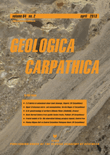
GEOLOGICA CARPATHICA
Fostering Innovation in Geological ResearchGEOLOGICA CARPATHICA, with ISSN 1335-0552 and E-ISSN 1336-8052, is a distinguished open access journal published by the Slovak Academy of Sciences Geological Institute, serving as a pivotal platform for the dissemination of research in the field of Geology. Established in 1991 and continuing through 2024, the journal is recognized for its significant contributions to Earth and Planetary Sciences, evidenced by its 2023 Scopus ranking placing it in the second quartile (Q2) within Geology. With an H-index that showcases its impactful publications, GEOLOGICA CARPATHICA is committed to fostering scholarly communication while promoting accessible research, having adopted an open access model since 2009. Located in beautiful Bratislava, Slovakia, this journal aims to engage a global audience of researchers, professionals, and students interested in ecological, geological, and environmental studies, making it a prominent resource for enriching the scientific community's understanding of the Carpathian region and beyond.
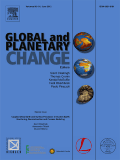
GLOBAL AND PLANETARY CHANGE
Exploring the Dynamics of Our Changing PlanetGLOBAL AND PLANETARY CHANGE, published by Elsevier, is a premier international journal focused on the critical issues surrounding environmental science, climate change, and planetary dynamics. Since its inception in 1989, this journal has established itself as a leading voice in the field, currently holding a prestigious Q1 ranking in both Global and Planetary Change and Oceanography as of 2023. With a remarkable influence reflected in its Scopus rankings—15th in Earth and Planetary Sciences and 34th in Global and Planetary Change—it serves as an essential platform for researchers, professionals, and students. The journal provides a comprehensive examination of cutting-edge research findings and innovative developments that address the urgent challenges facing our planet. Although it is not an Open Access journal, it remains a vital resource for anyone keen to contribute to or stay informed on the ever-evolving discourse of global environmental change, promoting sustainable solutions for the future.
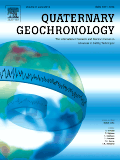
Quaternary Geochronology
Charting the Timeline of Our Planet's Recent Past.Quaternary Geochronology is a leading journal published by Elsevier Ltd, specializing in the field of Earth and Planetary Sciences. With a strong emphasis on the geochronological methods and techniques used to date geological materials from the Quaternary period, this prestigious journal serves as a critical platform for disseminating significant research findings, theoretical advancements, and comprehensive reviews relevant to the stratigraphic and geological sciences. Since its inception in 2006, the journal has garnered an impressive impact factor, positioning itself in the Q1 category for its excellence in Earth and Planetary Sciences, Geology, and Stratigraphy. Quaternary Geochronology currently ranks #11 out of 55 in Stratigraphy, #74 out of 321 in Geology, and maintains a high standing across various related fields. Researchers, professionals, and students are encouraged to explore its rich archives and current issues for the latest trends, methodologies, and findings that shape our understanding of Quaternary environments. The journal does not operate under an open-access model, ensuring that high-quality peer-reviewed research is accessible while maintaining rigorous academic standards.
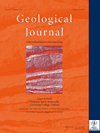
GEOLOGICAL JOURNAL
Illuminating the path of geological research for over seven decades.GEOLOGICAL JOURNAL, an esteemed publication by WILEY, has been at the forefront of geological research since its inception in 1951. With an ISSN of 0072-1050 and E-ISSN of 1099-1034, this journal serves as a vital platform for disseminating high-quality, peer-reviewed research in the field of geology. Operating out of the United Kingdom, the journal proudly features a Scopus rank of 80 out of 321 in the Earth and Planetary Sciences category, reflecting its commitment to scholarly excellence, with a 2023 category quartile ranking of Q2. As part of its innovative approach, GEOLOGICAL JOURNAL seeks to foster interdisciplinary collaborations, advancing our understanding of earth processes, materials, and history. Although it does not offer open access options, its robust subscription model ensures that both professionals and students have access to groundbreaking insights. With a publication history that spans over seven decades, the GEOLOGICAL JOURNAL continues to be an indispensable resource for the global geological community, encouraging discoveries that shape our comprehension of the planet.
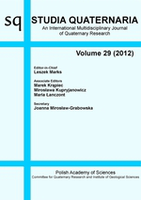
Studia Quaternaria
Pioneering research for a deeper understanding of geology.Studia Quaternaria is a leading academic journal published by the Polish Academy of Sciences, Institute of Geological Sciences, specializing in the dynamic fields of Earth-Surface Processes and Geology. With an ISSN of 1641-5558 and an E-ISSN of 2300-0384, this journal has been a prominent platform for scholarly discourse since its inception in 2000. Operating under the open-access model, it aims to disseminate high-quality research that is accessible to a global audience. Studia Quaternaria holds a Q3 ranking in both relevant quartiles as of 2023, indicating its commitment to advancing knowledge in its disciplines despite centering in competitive academic environments. With its publications indexed in Scopus, the journal remains a valuable resource for researchers, professionals, and students looking to stay abreast of innovations and discoveries in Earth-Surface Processes and Geology. Encompassing a broad scope of studies, the journal represents an essential contribution to the geological sciences, fostering a deeper understanding of our planet's changes and processes.

Stratigraphy
Exploring the Depths of Geological TimeStratigraphy is a distinguished journal dedicated to advancing the field of paleontology and stratigraphic research. Published by MICRO PRESS in the United States, this journal is accessible via its ISSN 1547-139X and E-ISSN 2331-656X, providing an essential platform for researchers, professionals, and students alike. With a robust focus on the intricate relationships between geological time and the fossil record, Stratigraphy aims to disseminate high-quality research that enhances our understanding of Earth’s history. Its ranking within the 2023 Q2 category of paleontology reflects its commitment to scholarly excellence, as noted by a Scopus ranking of #65 out of 113 in the Earth and Planetary Sciences domain, placing it in the 42nd percentile. Although not open access, the journal's valuable contributions from 1988 to 2024 encourage a collaborative dialogue among the scientific community, underscoring the significance of stratigraphic studies in environmental and evolutionary research.